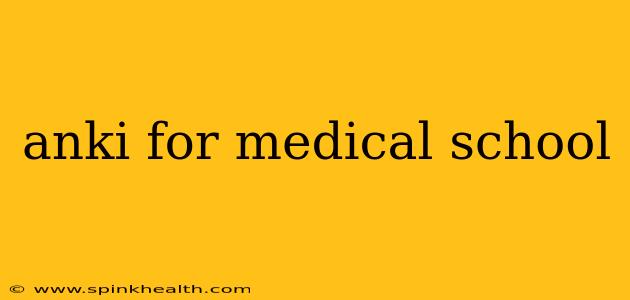Anki: Your Secret Weapon for Conquering Medical School
The hallowed halls of medical school. The sheer volume of information. The relentless pressure. It's a daunting prospect, a marathon, not a sprint. But what if I told you there's a tool that could significantly lighten your load, sharpen your memory, and help you navigate this challenging landscape with greater ease and confidence? That tool is Anki.
My journey through medical school felt like scaling Mount Everest – steep, relentless, and occasionally terrifying. But Anki became my trusty Sherpa, guiding me through the treacherous terrain of endless facts, complex pathways, and intricate diagnoses. It wasn't a magical cure-all, but it provided a structured, efficient, and incredibly effective way to learn and retain information. This isn't just another Anki tutorial; it's a story of how this powerful tool transformed my medical school experience.
What is Anki and Why Should Med Students Use It?
Anki is a powerful spaced repetition system (SRS) flashcard program. Instead of passively cramming information, Anki uses algorithms to present you with flashcards at optimal intervals, maximizing retention and minimizing wasted time. Think of it as a personalized tutor that constantly adapts to your learning style and challenges you just when you need it. For medical students facing an avalanche of information, this personalized approach is game-changing.
Imagine trying to memorize the Krebs cycle, the intricacies of the cardiac conduction system, or the differential diagnosis of chest pain using traditional methods. It's overwhelming! Anki breaks down these complex topics into manageable chunks, allowing you to build a solid foundation of knowledge piece by piece.
How to Use Anki Effectively in Medical School
The key to Anki’s success lies not just in the software itself, but in how you use it. It's not a magic bullet; it requires a strategic approach. Here's what worked for me:
-
Create high-yield flashcards: Don't just copy and paste lecture notes. Craft concise, focused flashcards that test your knowledge in a meaningful way. Use images, diagrams, and mnemonics to boost memorization. Think: "Question on one side, answer on the other".
-
Regular Review is Key: Consistency is crucial. Set aside dedicated time each day, even if it's just for 15-30 minutes. Regular review reinforces learning and prevents the dreaded forgetting curve from taking hold.
-
Active Recall: Anki forces you to actively recall information, which significantly improves retention compared to passive review. Don't just glance at the answer; truly test yourself.
-
Embrace the Add-ons: Anki boasts a wealth of add-ons that can enhance its functionality. Explore options that suit your learning style and specific needs.
-
Community Resources: Leverage the power of the Anki community! Numerous pre-made Anki decks are available for various medical school subjects. These can save you valuable time and effort.
Is Anki Better Than Other Flashcard Apps?
Many flashcard apps exist, but Anki distinguishes itself through its sophisticated spaced repetition system. While other apps may offer similar functionality, Anki's algorithm is rigorously tested and refined, making it exceptionally effective for long-term retention. The customizability and community support are also significant advantages.
What are the Best Anki Add-ons for Med Students?
Several add-ons can significantly boost your Anki experience. These include:
-
AnkiConnect: Enables seamless integration with other apps and services.
-
Image Occlusion: Allows you to progressively reveal parts of an image, enhancing active recall.
Can Anki Replace Textbooks and Lectures?
Absolutely not. Anki is a powerful supplementary tool, not a replacement for core learning materials. Use it to reinforce what you've learned in lectures and textbooks, not as your sole source of information.
How Much Time Should I Dedicate to Anki Daily?
The ideal time commitment depends on your individual needs and learning style. Start with a manageable amount, like 30 minutes a day, and adjust as needed. Consistency is key.
My journey through medical school was undoubtedly challenging, but Anki significantly eased the burden. It became my trusted ally, helping me conquer the vast ocean of medical knowledge. It wasn't a magic wand, but a powerful tool that, when used effectively, can truly transform your medical school experience. Embrace Anki, and let it become your secret weapon in this incredible journey.

